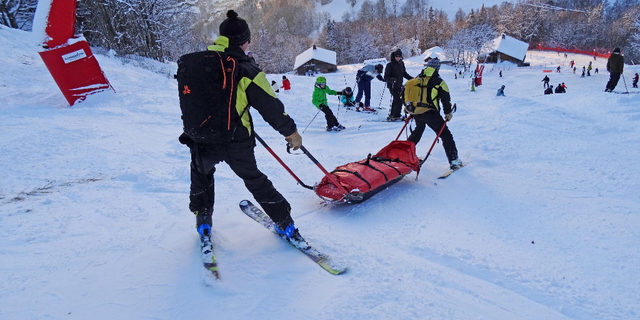Switzerland is an exceptional playground for winter sports, but many residents do not hesitate to cross borders to discover new areas. According to a recent survey conducted by the Belgian website European Best Destination among 110,000 holidaymakers, Alpe d’Huez was named the best ski area in Europe, followed by Brixental in Austria and Val Thorens in Savoie, which complete the podium. The Swiss resorts reach 5th place only with Crans-Montana, then further on Zermatt getting the 11th place… This shows the attractiveness of the resorts – especially – French! More than the reasons (budget, second home…) we are interested here in the consequences – sometimes dramatic – of such a choice in the event of a problem, such as an accident.
An interview with M., asset manager, who experienced a serious ski accident in neighbouring France in 2018. What about care in such a case? His testimony, followed by the insights of our expert.
“Last year, as every year, I went to Megève at the end of March for a weekend to enjoy an exceptional end of season in terms of snow cover. A day that was supposed to be perfect, but which was stopped by a collision of incredible strength with another skier. The shock, the pain, the total loss of landmarks, then the imminent arrival of the French rescue services and a helicopter ride to the nearest hospital: Salanches.
But at the end of a busy winter season, the first observation is : the hospital is 100% full! No other options, I’m being held up as best I can. This is followed by an anxiety-inducing wait, which will become the common thread of this stay: Who should I contact in such a case? How to be cared for in a foreign country? Which service to call on a Sunday? Who should I contact first, the employer or accident insurance directly? These are all questions to which the hospital staff also had no answers (even having a lively debate in front of me about the various possible options…). Options, as I understand it then, depend of the diagnosis, – takes a very long time to come. It will finally be a double fracture of the pelvis and a crack in the sacrum, with the spectre of a lifelong disability. A night on this hospital, no choice.
Monday morning, I finally managed to join the accident insurance company, which then took things in hand. Repatriation is organized. This is followed by a complete work stoppage of more than 3 months, with all the professional consequences that this entails. At the same time, the opening of legal proceedings through the subscription to legal insurance is still ongoing, complicated by the “international” dimension of the case.
Beyond the physical consequences, the emotional, mental and psychological burden that such an induced situation causes is often underestimated. I would have liked to be able to turn directly to a trusted interlocutor, in order to have a clear vision on the progress of the procedure, both in terms of immediate and post-operation care. The same goes for my husband and family, who are not always thought of in this kind of case, who cannot fully fulfil their support role as they are as helpless as we are on the way forward. The moral of all this: don’t wait for such a dramatic scenario to happen, check with your insurance company or any other relevant interlocutor beforehand!”
The point of view of Fanny Eyraud, expert from Opal International Health Insurance :
“It is precisely this kind of case that we considered when we created OPAL. In a globalized world, where people are constantly moving from one country to another (not to mention Switzerland, which borders many countries!), how can simple procedures be put in place in the event of health problems/accidents? For many years, we have built an international network of care, from doctors, specialists, hospitals and clinics, that allows the insured to know where to go in such situations.
In the case of M., where the vital prognosis was engaged, if the helicopter is of course transported to the nearest hospital, we can then relay with the patient and the facility, regardless of the day and time. Our staff is available 24/7. A vital asset of trust when you find yourself so helpless, both physically and morally. Once the contact has been made, we take care of the repatriation and care, as soon as possible in order to avoid any collateral damage such as stress, anxiety or even depression of the person concerned.
For loved ones, assistance is also available at all times, a significant support as explained by M. Because in addition to physical problem, the mental burden of the patient but also of his entourage must not be neglected! Having support and a time horizon in this “return home” seems to me to be an undeniable added value.”








